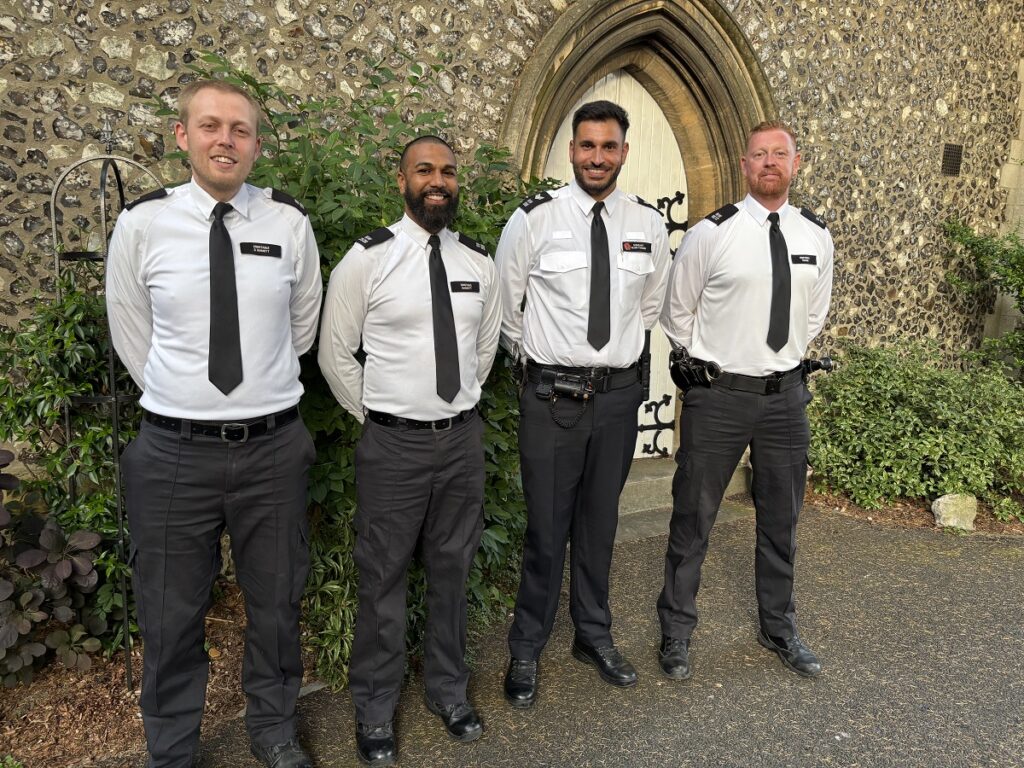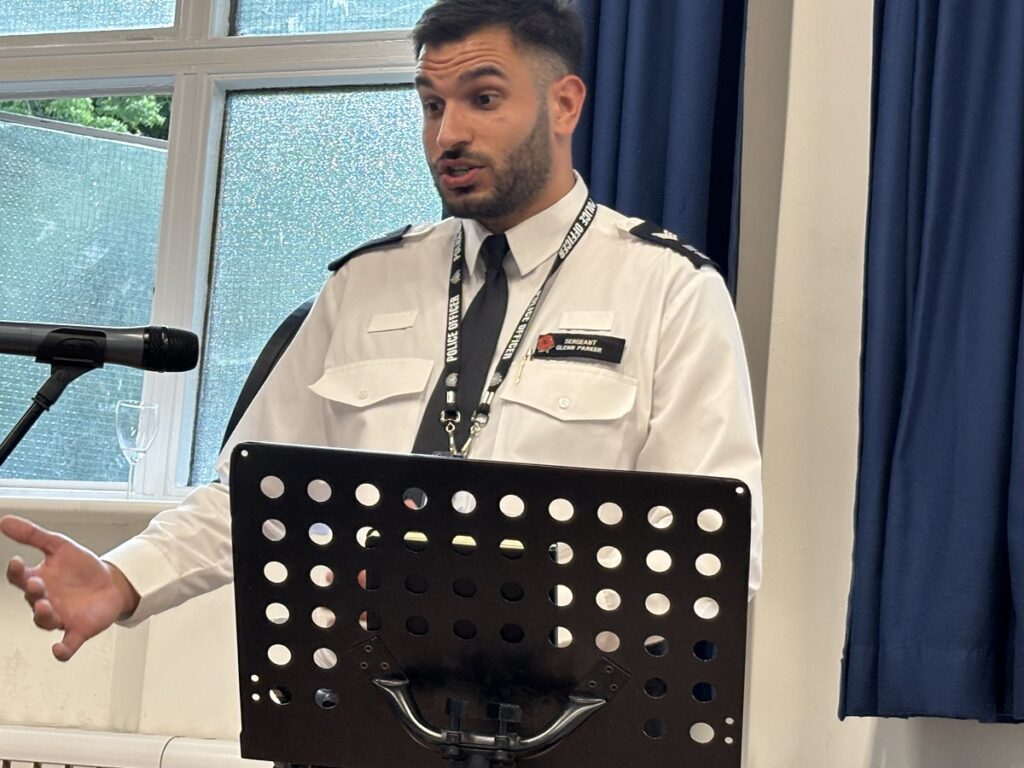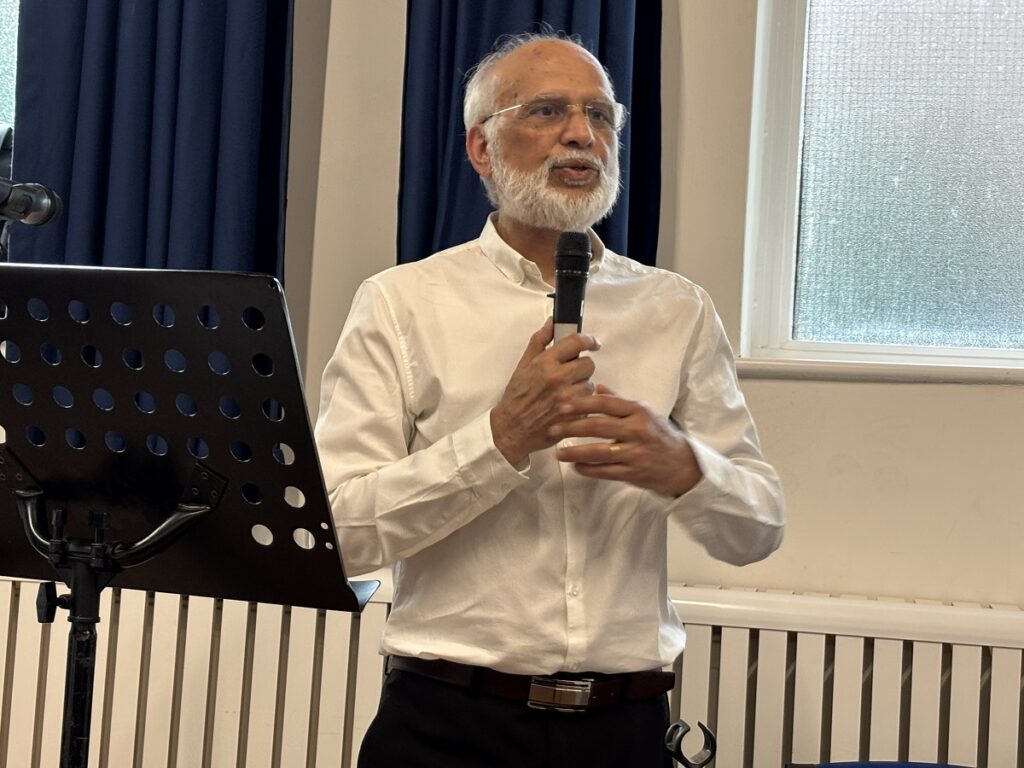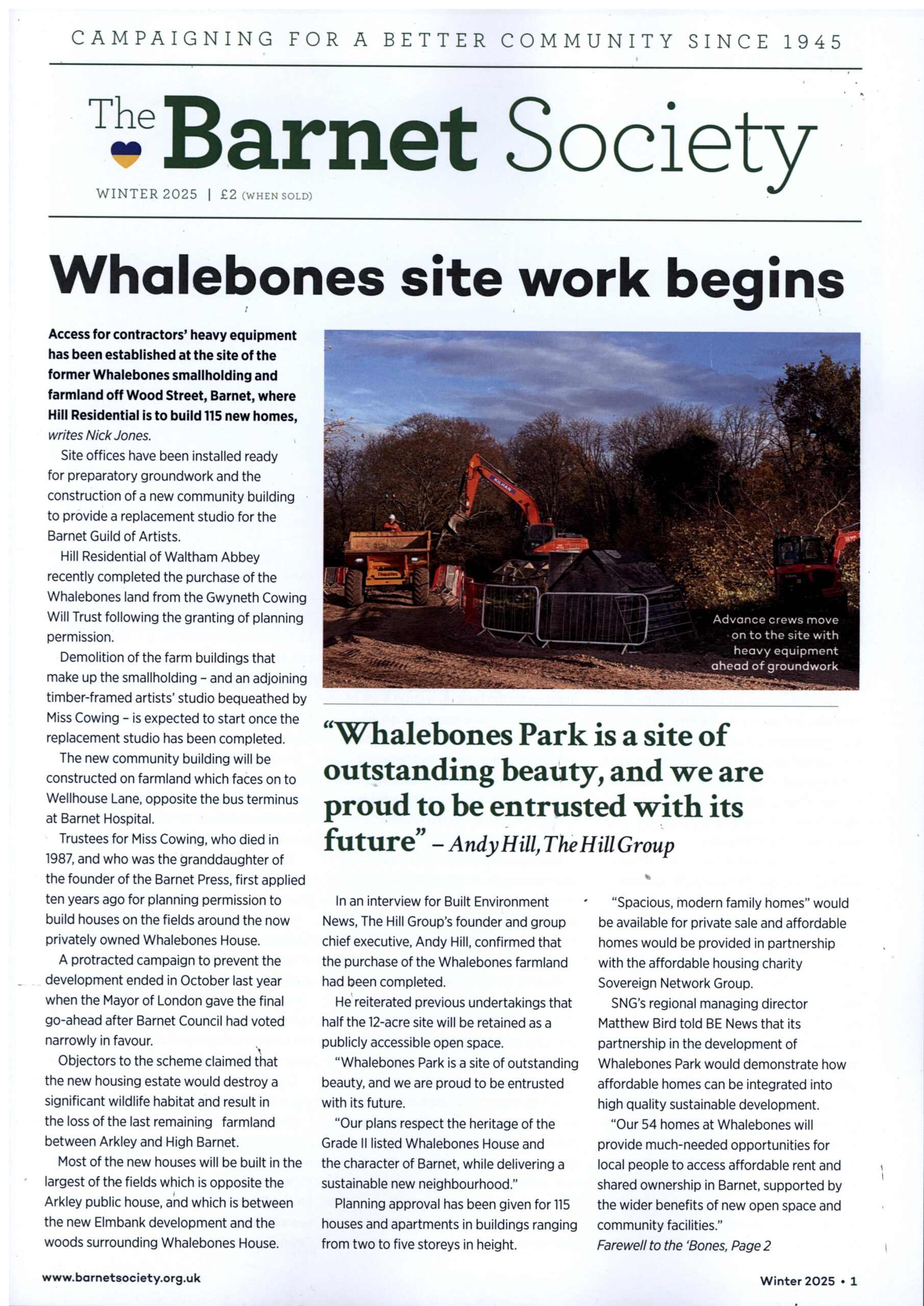Plain clothes police proving more effective in tackling Barnet’s shoplifting and drug users than uniform patrols in High Street

Since the start of the year police officers in the neighbourhood team for High Barnet and Barnet Vale have spent most of their time in plain clothes targeting persistent offenders including shoplifters and drug dealers and have made a total of 55 arrests.
Their team leader, Sergeant Glenn Parker, acknowledges that many residents would like to see more uniformed officers on duty in the town centre, but he insists their tactics are currently proving to be far more effective.
Through tackling shoplifting and arresting repeat offenders, there had been a decrease in house burglaries over the same period – down by 25 per cent in High Barnet and 52 per cent reduction in Barnet Vale.
Sergeant Parker – seen above, from left to right with police constables Sam Emmott, Richard Maggott, Sergeant Parker, and Mike Tearle – addressed the annual meeting of the Barnet Society (19.6.2025).
He said that the neighbourhood police team had a choice: go back to visible policing in the High Street, which could be ineffective, or adopt plain clothes tactics to tackle shoplifters and drug dealers to help restore trust in the Police.
“I would like to send officers out into the town centre in uniform, but my priority is to tackle the shoplifters, so either you have officers parading up and down the High Street or you take action that will really help to make people feel safe.
“I know residents want to see officers out on the beat, but we have to assess whether having officers walking up and down the street is effective. We want the public to have faith in what we are doing.”
Before the team started their targeted operation, there had been a tangible loss of trust among High Barnet shopkeepers and businesses.

On taking up his position in January, Sergeant Parker said he had been distressed to find that the manager at Waitrose in The Spires had felt it was no longer worth reporting shoplifting because of a lack of a police response.
“The shops had videos of shoplifters filling their bags and walking out. That was the challenge. We need the shops to engage with us.
“If the public see a policeman in uniform in the High Street, they might think that is fantastic, but the criminals can see us as well and I don’t want them to have that advantage.”
Since the start of the year the team had been building up intelligence passed on by retailers and arrests had followed.
One persistent offender, known to have been involved in 40 shop lifting offences in and around High Barnet and Barnet Vale, had been arrested and sentenced to 96 weeks in prison.
Sergeant Parker said the turn-around in arrests had been seen in wards across the northern parts of the borough – High Barnet, Barnet Vale, Underhill, East Barnet, Totteridge, Whetstone, Mill Hill and Edgwarebury.
During 2024 there were a total 34 arrests across the eight wards – a result which he considered was unacceptable; there were only 12 stop and searches of suspects.
In the five and a half months up to June 18 this year there had been 154 arrests across the same eight wards – five times the number of offenders arrested – with 55 arrests in High Barnet and Barnet Vale.
“If we had not deployed officers in plain clothes, it would have been half that.”
Sergeant Parker stressed the importance of stop and search, a tactic which had decreased massively in it use because of a lack of trust in the Police. He was determined to change that.
In the last three months 27 people had been stopped and searched in High Barnet and Barnet Vale resulting in 13 arrests for offences including knives and stolen items. There had been 20 drug searches and five arrests.
Further targeted operations, based on intelligence, were about to be launched including in one in an unnamed street where there was “a nuisance address” from which offenders had been causing problems. He promised they would be “smashed and removed”.

In opening the meeting, Mahender Khari, chair of the High Barnet community action panel which liaises with the police, praised Sergeant Parker and his officers, describing him as an “action man” who was building the strongest police team in the borough.
In replying to questions, Sergeant Parker told Dr Jenny Remfry, the society’s vice president, that currently the best way to report non-urgent suspected offences or get crime advice, was to email the neighbourhood police team or to ring 101 which went through to the call centre in Hendon which would assess the information and could forward it to the neighbourhood teams.
A new messaging service for public use — known as Met Engage – was about to be introduced by the Metropolitan Police.
Training for neighbourhood officers began a month ago and it would create a centralised system for alerts to be emailed directly to the police and allow officers to respond.
Once residents signed up, email groups could be established, perhaps in a road or a group of streets, and this could facilitate police appeals for CCTV and other information.
In response to another question about the use of new technology, Sergeant Parker explained the value of the rapid increase in the installation of CCTV, door cameras and dash cams.
Although a potential intruder might be wearing a balaclava when caught on a door camera, offenders might well be captured on a neighbour’s camera further along the street, perhaps removing a balaclava – footage that could be of potential significance.
“Once it is up and running in the next couple of months, a system like Met Engage will make it easier for people to give us local intelligence.
“We will be able to reply, and it should make it easier for neighbourhood policing to integrate with the community.”
He told the society’s vice chairman Eamonn Rafferty, who was concerned about drug users congregating in the car park at Chipping Barnet Library, that this was precisely what they wanted to hear about.
“We need to the community to step up. The more information we get, the more action we can take.”
Barnet Society member John Gardiner asked whether neighbourhood policing was still being disrupted by the extraction of officers from the suburbs for deployments elsewhere by the Metropolitan Police.
Sergeant Parker said that increasingly neighbourhood policing was being “ring fenced” and other officers were being deployed. In May, no officer in his team had been extracted for other duties and there had been only two occasions so far in June.
Frances Wilson, the society’s minute secretary, asked if there was any chance of the Metropolitan Police re-opening High Barnet police station to the public.
Sergeant Parker said there no plans to re-open station for operational police officers with a custody suite and desk open to the public, but it would continue as a base for the neighbourhood teams and other police services.

Robin Bishop (above left), who leads for the society on planning and the environment, warned that significant planning decisions were on their way.
Transport for London through its development subsidiary Places for London was due to submit an application by the end of June to build flats on land around High Barnet tube station and an application to build a new stadium for Barnet Football Club at Barnet Playing Fields was due to be considered by the strategic planning committee in July.
Tags: #Barnet High Street #High Barnet #People And Personalities
3 thoughts on “Plain clothes police proving more effective in tackling Barnet’s shoplifting and drug users than uniform patrols in High Street”
Comments are closed.


My daughter iwas being harassed by a man in Edgware. She called the police and they were there within a couple of minutes.. they picked up the man and sensitively supporting my daughter. Can’t praise the police highly enough.
Absolutely brilliant – well done!! Reflecting on this, it seems vital, due to the actual outcomes, to continue with your marvellous plain -clothed strategy. However, the public DO feel safer when police are in sight or patrolling the area. The visible presence is somewhat reassuring, and when you grow up, as I did, seeing beat officers around, it feels like a safer and more secure society, increasing a feeling of well-being. The upshot of this is that I think there should be……both. They both serve different, equally important functions and I absolutely applaud the team for the past year’s very significant outcomes.
More Info on Met Engage: https://www.met.police.uk/police-forces/metropolitan-police/areas/campaigns/2025/stay-informed-with-met-engage